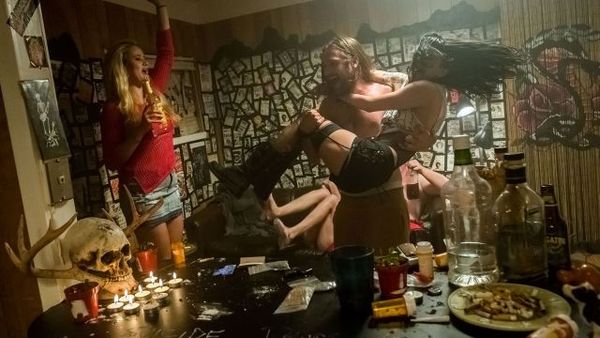 |
| Trailer party tonight |
One of the biggest hits on the horror festival circuit this year, pulp crime spectacular 68 Kill is about to be released on DVD and Blu-ray. It's the sort of film you can see once and never forget, even if you're a critic who watches 20 films a week. Earlier this year, when it screened at Fantasia, I chatted to producer Travis Stevens about how it came into being.
 |
| Liza introduces her brother |
"The primary factor was writer/director Trent Haaga," he told me. "We've had a friendship for many years - we worked together on a movie called Cheap Thrills and you know, we'd both made a few movies since then, but he called me up and he said 'I want to write and direct this thing called 68 Kill based on a crime novel I've read.' So I read the novel to see what this thing is and it's a really, really simple story but then the fun part is that he goes 'What do we do to bring it to life and what things do we push further?' Trent has a lot of wild ideas and I think that's what ends up making the movie what it is."
Structurally, the film is basically a road movie. Liza (AnnaLynne McCord) talks boyfriend Chip (Matthew Gray Gubler) into robbing her sugar daddy, but when what is supposed to be a simple break-in turns into murder and kidnapping, the two have to get out of town fast. Chip learns some new things about Liza along the way, but his life is about to get a lot stranger.
"The producer/director relationship is kind of a filter," says Travis. "My job is to say 'That's working, this isn't working, or have you thought about this?'" he says, and explains that in this case that included changing things from the novel structurally and making sure the gender politics in it would work for a modern audience. "In books things are a a lot more rudimentary and that can work in a pulp crime novel but we felt it was an opportunity to explore a little bit more and have a man who is subservient to strong women."
 |
| Chip knows who's in charge |
Chip's submissiveness is certainly a striking feature of the film, and the women just keep getting fiercer. Also interesting is the film's focus on the kind of social outcasts who don't get a look-in in most thrillers.
"A lot of that was in the source material, a lot of it is in Trent's world view, how he views humanity, especially lower class blue collar characters grounded in a world where ten thousand dollars could change a life. I mean, this is a lot of money to these people. It makes the characters feel a bit more real even when they're wild and cartoonish. We tried to find the truth in each of them."
So how did he find the film's charismatic stars?
"I'm fortunate to have other filmmaker friends who had worked with AnnaLynne and Matthew Gray Gubler before. With the other cast members it was a matter of taking the time to meet with actors and find the right actors for each role."
Was it difficult persuading them to take a chance on something like this?
"It's funny but it was and I think part of that is because Trent as director wasn't a proven commodity and with the material being so outrageous, well, agents want to make sure that their clients don't end up in a commercial bomb. Once we were able to talk directly then it went quickly."
 |
| Crime doesn't always go to plan |
There's some great supporting work in the film. It also has a refreshingly diverse cast.
"When it came to casting, ethnicities were not specified in the book and I made the decision to take every opportunity to cast young people of colour and people from different ethnic background. I think if you don't consciously do that it's very easy to end up just with bunch of white people."
Alongside the great performances, one of the things that makes the film stand out is an amazing soundtrack, with the action carefully choreographed in a style that some critics have compared to the work of Quentin Tarantino.
"Music is a real challenge in lower budget filmmaking. It's such an important tool to convey tone but a lot of filmmakers don't get the opportunity to use it because they can't afford it. The music business is so tough. It just looks at licensing songs to movies as a revenue stream. Trent came in with a very clear idea and then it came down to finding music we could afford. Tarantino can get anything he wants!" He laughs. "Our composers James [Griffiths] and [Haim] Frank [Ilfman] were really good at linking it all together and consistently conveying the tone we wanted."
How did they give the film its distinctive look?
 |
| Don't call her emo |
"A lot of that was thanks to Angela Schroeder, our production designer. Trent and I are both really visual guys... In the third act, in the trailer with all the punk rock posters, it really loked like a space these characters have lived in for years."
We discuss locations and the challenges of shooting.
"Louisiana seems to be the most violent, chaotic place in the 'States that I've ever been to," says Travis. "You never know what the universe is going to put in front of you but we had to deal with everything from wild animals to tropical storms and it's just like this real Wild West place... but stepping on set for the first day and really seeing, hey, that's Matthew Gray Gubler in his character's wardrobe, was amazing. The first thing we shot was actually the opening scene of the movie. Seeing the characters in the trailer park I thought 'Yes, this going to work."
The film was a big success at Fantasia and would later go on to enjoy a similar reception at Frightfest.
"We feel blessed every time we get picked up by a festival where we think our movies will play well. There's nothing better than playing in front of a few hundred genre fans... I watch everything but I'm a lifelong horror fan."
68 Kill is available to DVD and Blu-ray from Monday 27 November.





















